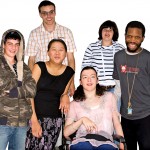
Qualitative methods engaging and involving people with learning disabilities are becoming more established in the published media, but there is still room for improvement.
In her debut blog, Victoria Smillie looks at an exploration of these methods which sets out to understand how qualitative methods such as interviews and focus groups, are represented in the published journals.
[read the full story...]







